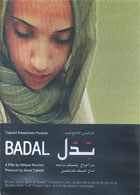
Badal 2005
Distributed by Docs for Education, 10a Holland St., Afulla, Israel 18371; fax: 972-3-5291726
Produced by Osnat Trabelsi, Trabelsi Productions
Directed by Ibtisam Mara’ana
DVD, color, 52 min.
Jr. High - General Adult
Israel, Middle East, Women’s Rights, Human Rights, Activism, Social Movement
Date Entered: 06/04/2012
Reviewed by Malcolm L. Rigsby, Department of Sociology and Human Services, Henderson State University, Arkadelphia, ArkansasIn a culture where women do not venture into life and secure jobs outside the family home, there is no future unless you are married. For many older girls and young women the pressure to abide by the cultures norm of being married calls for them to honor the age-old tradition of badal. As one widower (Wajib) states in his interview, “yes I would like to remarry someday, but only after my daughter (Mayada) is married. His mother (Umm Wajih) looks on and says ‘badal is the answer’. Wajib shakes his head in agreement.” In the transaction, his daughter will get a husband and he will get a wife. This ancient custom still prevails in certain cultures around the world.
We find that in this tradition, love is of no consideration; bride and groom may often never see each other or meet until the day of the wedding. Through the eyes and thoughts of Umm Wajih, Wajib, and Mayada, we travel through the process of match making “badal style.” In this tradition, “matchmakers” contact family elder women and propose matches for their children, grandchildren and great grandchildren in marriage. Elder matriarchs of the families contacted for the negotiation come on inspection to see if the daughter measures up to their expectations. In Mayada’s case we see that she is put under pressure to “sell herself” in the process so the family will not be dishonored during the negotiations. Refusals to enter marriage contracts after these inspections are often blamed on the female.
Within the community though we see that there is social movement among some women seeking change and to realize their dreams. The women of the discussion and therapy group discuss their dreams and how life worked for them under the tradition of badal. Some women discuss dreams that often never materialized after they were married badal style, others share that they were afraid to dream for fear of disappointment. Ironically, the facilitator of the women’s therapy group is no other than one of Umm Wajih’s daughter-in-laws.
This film is well edited. The photography and sound is very good. Scenes and transitions are well narrated and accompanied by subtitles. The director does an excellent job of integrating narration and dialogue so that an intimate and engaging story is told. The DVD that I reviewed had some technical flaws and skipped every few moments, however this was probably only a defective disc. The film’s functionality could be improved by a scene selection menu so that discussion groups could easily review and return to chapters in the video.
Awards
- 2004 Spirit of Freedom Award for Best Project – Jerusalem Film Festival
- 2006 Hot Docs, Best mid-length documentary
- 2006 “Sole e Luna” Doc Fest, First Prize